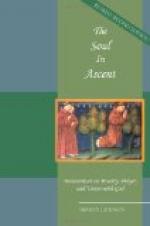On what do we base our faith that the soul exists after death? That it does is clearly the faith not only of religious teachers but of many of the latest and most eminent scientists. Many expounders of evolutionary philosophy unite in telling us that “the cosmic process” having reached man, a spiritual being, can go no further in the physical order; that evolution will never produce a higher being than a spirit, but that the “cosmic” force will still persist and be utilized in the expansion and perfection of spirits.
In treating this subject little attention will be given to the scriptural argument, for there is little if any difference of opinion concerning the teaching of Jesus and that of the writers of the New Testament. They are united and consistent in assuming the persistence of being. That belief underlies all their appeals to the solemn sanctions of the moral law which they derived from the future life. Jesus himself said, “If it were not so, I would have told you;” and nearly, if not quite all the Apostles base their warnings and their invitations on motives which reach beyond the death of the body. The masters of other religions have been equally positive. In some form or other they have asserted the continued existence of the spiritual nature in man.
But we turn, for the moment, from these and consider such evidence as may be derived from the soul itself, and from what is known of its progress.
There is no evidence that when the body dies the soul dies with it. It may not be possible to prove the reverse; all that we know is that the vital functions cease, and that the body decays. No eye ever saw the soul, and no dissection ever discovered the place of its dwelling. Is that ethereal something which we call soul simply the result of the organization of atoms? Or is the body like a house in which a spiritual tenant dwells? At least this may be affirmed: No one has yet been able to prove that the soul and body die together. Then there is no reasonable presumption against the continuance of being. No spirit, so far as we know, has returned to the earth in visible form, and spoken its message; and yet, for aught we know, we may be surrounded every day by spiritual beings, moving unseen along the avenues upon which we walk, and entering without invitation the houses which we inhabit. At this point it is enough simply to grant that presumptions are, perhaps, evenly balanced. If one asks for proof that the spirit persists, the only reply must be a Socratic one—Can you prove that it is vitally connected with the body?
Belief in the existence of the soul after death seems to be an innate belief. It has been ascribed to the influence of the superstition about ghosts; but that superstition is only an unscientific form of the larger faith in the persistence of being. Where did this conviction originate? We think only of such things as have been experienced. No thought is ever entirely original. Even imagination




